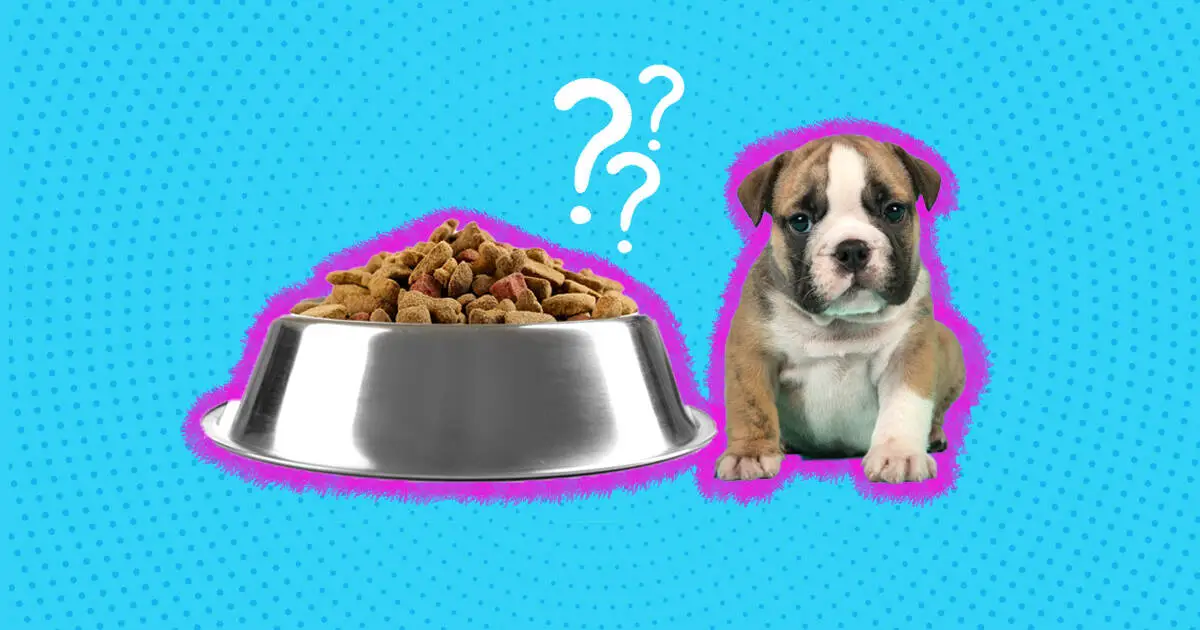
Introduction
You’re about to feed your dog when you realize the adult kibble bag is empty. In the pantry sits a half-used bag of puppy food from months ago. The question pops up: Can my dog eat this instead?
It’s a common situation in households with both puppies and adult dogs. The quick answer is yes—in certain cases. But puppy food is designed for growth, and long-term use in adults can cause problems. Here’s what you need to know before filling that bowl.
Can Adult Dogs Eat Puppy Food?
A healthy adult can eat puppy food occasionally without harm. The concern is with regular feeding. Puppy food contains more calories, fat, and protein to support rapid growth. For an adult with normal activity, this can mean quick weight gain, joint strain, and nutrient imbalances.
Think of it like a professional athlete’s diet—it’s perfect for someone in intense training, but too much for someone with average activity.
How Puppy Food Differs from Adult Dog Food
1. Higher Protein and Fat
Puppy food usually contains 22–32% protein and higher fat to fuel muscle and bone development. Adult dogs who don’t need this extra fuel store it as fat.
2. More Vitamins and Minerals for Growth
Extra calcium, phosphorus, and DHA in puppy food build strong bones and brain development in young dogs. But for adults, too much calcium can strain bones and joints, especially in large breeds.
3. Calorie Density
Puppy food is calorie-packed so young pups get enough energy from small portions. For adults, the same portions can push them over their daily needs, leading to obesity.
When Puppy Food Can Be Safe for Adults
Underweight or Recovering Dogs
If an adult dog needs to gain weight after illness, injury, or poor nutrition, the richer formula can help rebuild muscle and body condition.
Pregnant or Nursing Dogs
During pregnancy and lactation, dogs need far more calories and nutrients—similar to a growing puppy. Puppy food can meet these demands without increasing portion size dramatically.
Highly Active or Working Dogs
Herding dogs, sled dogs, and hunting dogs burn energy quickly. The extra protein and calories in puppy food can help maintain their weight and performance.
Risks of Feeding Puppy Food Long-Term
Weight Gain and Obesity
Unused calories turn into fat. Excess weight increases the risk of joint issues, heart strain, diabetes, and shorter lifespan.
Joint and Bone Stress
High calcium and phosphorus levels can cause bone and joint issues in adult dogs, particularly in large breeds prone to orthopedic problems.
Digestive Upset
Switching suddenly to richer food can cause diarrhea, vomiting, or gas. Dogs with sensitive stomachs are especially vulnerable.
How to Switch from Puppy to Adult Dog Food
If your adult dog has been eating puppy food regularly, transition gradually to prevent stomach upset:
- Days 1–3: 75% puppy food, 25% adult food
- Days 4–6: 50% puppy, 50% adult
- Days 7–10: 25% puppy, 75% adult
- Day 11 onward: 100% adult food
During the switch, watch their weight, stool quality, and energy. If issues arise, slow the process.
If Your Adult Dog Eats Puppy Food by Accident
One meal of puppy food is unlikely to harm a healthy adult dog. At most, they might have mild digestive upset.
However, if they consume a large amount and have health issues like pancreatitis, kidney disease, or obesity, call your vet. Keep an eye out for vomiting, diarrhea, bloating, or unusual lethargy.
Vet Guidance and Final Takeaway
Veterinarians recommend feeding dogs according to their life stage—puppy, adult, or senior—because nutrient needsCan Adult Dogs Eat Puppy Food? The Truth Explained change over time.
Puppy food is perfect for young dogs and occasionally helpful for certain adult situations, but it’s not an ideal daily diet for the average adult. The goal is balanced nutrition that maintains weight, supports joint health, and fuels activity without overloading the body.
If you’re unsure which food fits your dog’s needs, your vet can help choose a formula based on their age, breed, size, and activity level.
FAQs
-
1. Can senior dogs eat puppy food?
Not recommended. Senior dogs need fewer calories and more joint-friendly nutrients. Puppy food often causes unnecessary weight gain in older dogs.
-
2. Can adult dogs eat puppy food to build muscle?
Yes, in short-term, vet-supervised plans. The challenge is adding muscle without adding excess fat.
-
3. Is puppy food more expensive than adult food?
Usually, yes. Extra nutrients and supplements raise the cost per pound.
-
4. Best alternative to puppy food for adults?
Choose an adult “active” or “performance” formula. These offer more calories and protein than standard adult food without excess growth-stage minerals.




Leave a Reply